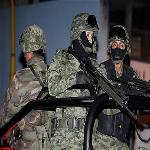08 January 2010

Photo: AP
Soldiers stand guard near an apartment complex in Cuernavaca, Mexico, 16 Dec 2009
On December 16, Mexican marines stormed a luxury apartment in Cuernavaca, near Mexico City, and killed Arturo Beltran Leyva, head of one of the country's largest drug trafficking organizations. A couple of weeks later, authorities arrested his brother, Carlos, further disrupting the command structure of the criminal enterprise. These were portrayed as important victories for Mexican President Felipe Calderon, whose war on drug gangs has been blamed for a wave of violence across the country in the past few years. US officials are applauding Calderon's efforts and trying to offer him as much support as they can.
The war against narcotics-trafficking cartels in Mexico is being watched closely by federal law enforcement officials here in the United States. The Drug Enforcement Administration, or DEA, is spearheading a multi-agency US effort at its field office in Houston.
Gary Hale, chief of intelligence at the Houston office, says sharing resources and information with the Mexican government has helped President Calderon to disrupt the criminal organizations' operations on the border. "To be realistic, we will never get rid of drug trafficking, per se, but we can have an effect on the overall business and the best effect that we have determined we can have is to disrupt and dismantle. And how do you do that? You go after command and control, you go after the leadership," he said.
Since President Calderon began his crusade against organized crime in Mexico in December, 2006, thousands of people have died in bloody confrontations between rival gangs and between cartel gunmen and police and military troops.
One indication of the brutality of the gangs came a week after the recent raid that resulted in the death of Arturo Beltran Leyva, the man known as the boss of bosses in Mexico's criminal underground. Gunmen killed the mother and several relatives of a marine killed during the raid, sending a message of fear to other marines, soldiers and police agents who are battling the cartels.
Gary Hale says Mexican authorities realize that the cartels are taking over large parts of Mexico and threatening the nation's sovereignty and that this motivates the soldiers and police agents to carry on the fight. "They are not doing it because they are forced to do it, they are not doing it because they make a lot of money, they're doing it because they are patriots. They are doing it because they love their country and they are doing the right thing," he said.
The DEA intelligence chief says the Mexican government efforts are making a difference, especially in reducing the amount of cocaine and other narcotics from South America that makes it over the US border. "The same amount of drugs are reaching Mexico, but they are having a difficult time, because of Calderon's policies, moving those drugs through Mexico and into the United States," he said.
Hale says much of the progress comes from the close working relationship US authorities have been able to establish with their Mexican counterparts. "We have tremendous intelligence sharing with them, they have good intelligence capabilities and so do we. We exchange intelligence with them quite frequently. There are occasional links of information or compromises, but, as a trend, they are doing an outstanding job of being partners with DEA and other federal law enforcement agencies of the United States," he said.
As for what happens next, now that the Beltran Leyva cartel has been hit hard, Hale says that remains an open question. "On the one hand, the remaining organizations may make peace and carve out territory. On the other hand, the various factions that were fighting before could escalate the violence that they have had between them," he said.
The prospect of even more violence between warring drug cartels is not pleasing to Mexicans in border cities that already resemble war zones, but most of the people being killed are involved in the drug trade. What will be crucial, in Gary Hale's view, is a sustained effort by both Mexico and the United States, working in cooperation, to further disrupt and cripple the criminal enterprises that threaten the security of both nations.